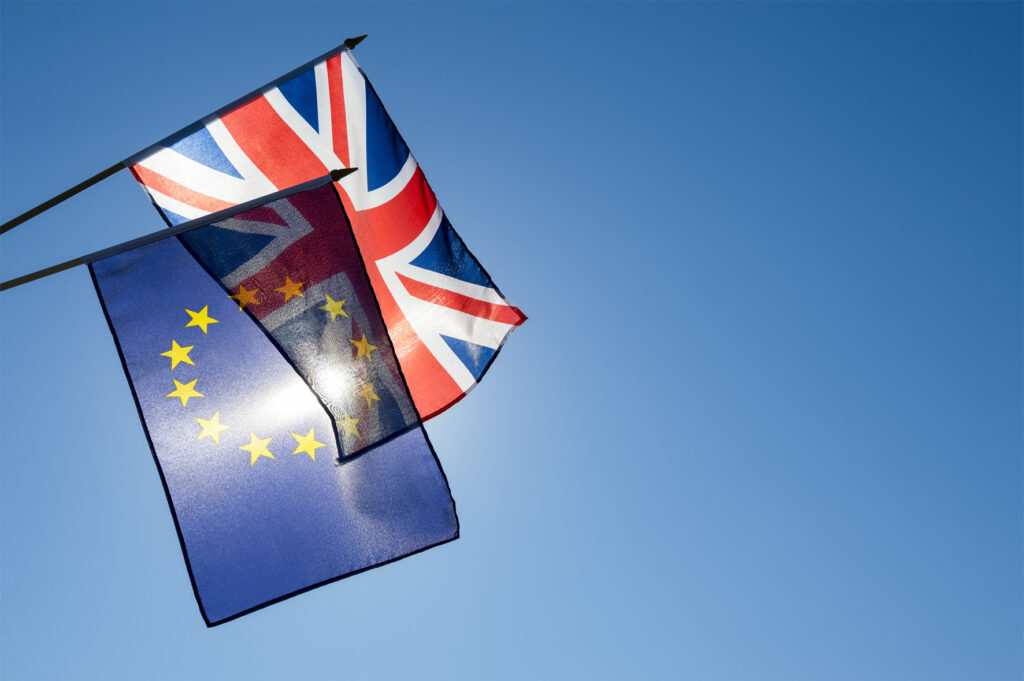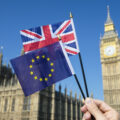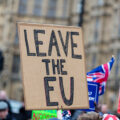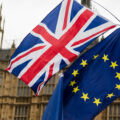Is the Brexit movement a religion?
Is the Brexit movement a religion?
Thousands of faithful, from a chosen nation, gather to express their beliefs that defy all evidence, driven by a desire for truth, fear, emotion. No, this is not a papal audience at the Vatican, but a Brexit rally. Analyst Frazer MacDiarmid approaches the Brexit movement from a sociological angle to see whether it in fact qualifies as a religion.
This article was written by Frazer MacDiarmid and reflects his personal analyses and opinions, rather than those of EARS.
Biologist and atheist Richard Dawkins’ hatred of religion is well-known. Religion leads people to ignore hard evidence, rely on emotion rather than reason, and to believe the unbelievable – which is frustrating to a man who founded his life on science.[1] As it turns out, it is for similar reasons that he also despises Brexit and its believers:
“I think the Brexiteers started out by having a belief [that Brexit] would be a good thing; it has become a religion now. It has become a faith. It has become a creed… It has become like religious zeal… It’s a form of madness.”[2]
The Brexit campaign was problematic because it found its strongest defenders in those least qualified to understand it. The opinion of experts was often viewed with suspicion if not completely written off.[3] The irony that the UK Brexit government is now desperately trying to restore faith in experts in the midst of a pandemic highlights the risks of promoting populism.[4]
For Dawkins, religious people are equally guilty of ignoring experts. Why would anyone wishing to understand the origin of the universe consult millennia-old texts rather than the most advanced scientists the world has ever known?[5] Dawkins may not have intended his suggestion that Brexit is a religion to be taken literally. Yet, as one who lived in Britain through the Brexit period, who has witnessed firsthand Brexit and counter-Brexit rallies, I certainly felt a kind of religious fervour about the Brexit movement.
Over the next five articles in this mini-series, I will use the criteria set out by a sociologist to assess whether the phenomenon of Brexit can be considered a religion. But first, let’s lay out a few caveats and definitions.
The difficulty of objectivity
Neither Brexit nor religion are simple concepts to deal with. Both tend to generate instinctive and often fierce responses for or against, based on a predetermined stance. Richard Dawkins, for example, considers religion not as an impartial observer but as one invested – intellectually, emotionally, and financially (indirectly through the proceeds of his books) – in its decline. He uses ‘religion’ as something like a term of abuse.[6]
Brexit may seem unlike religion to a non-religious Brexiteer, or a religious Remainer (someone who wants to remain in the EU). Conversely, a religious Brexiteer may agree with Dawkins that Brexit and religion are alike, but for completely different reasons. Because of how intensely polarising they are, we need to clearly define what is meant by the terms ‘Brexit’ and ‘religion’.
Defining Brexit
In case anyone’s memory needs refreshing, Brexit is the action of Britain leaving the European Union, which it entered as a member state in 1973. David Cameron’s Conservative government decided to hold a popular referendum in June 2016, in which the British people voted 52% to 48% in favour of Brexit.[7] After much delay, chaotic negotiation, and opposition from those opposed to Brexit (Remainers), Britain finally left the EU on 31 January 2020.[8]
Supporters of Brexit fall into different categories according to the degree of their devotion to the cause, ranging from hard- to soft-Brexiteers.[9] This series will focus mainly on hard-Brexiteers, since they embody and reflect the Brexit project most fully. Those who are most invested in Brexit will demonstrate the phenomenon most starkly. However, it is important to remember the diversity among Brexit supporters,[10] just as there is diversity among religious people.
Defining religion
Religion is a notoriously difficult word to define, but authorities usually mention the words supernatural, devotion, system, and belief.[11] [12] Sociologist Ronald L. Johnstone gives five characteristics of religion[13] which I will use to assess the case of Brexit:
- A group phenomenon;
- A body of beliefs;
- A set of practices;
- Involves moral prescriptions;
- Invokes sacredness.
I will expand on each of these in my coming articles.
It is important to highlight a clear difference. On the subject of Brexit, people are generally divided between those who support and believe in it, and those who do not. Religion on the other hand, is a bit more complicated: as well as those who have religious faith and those who do not, there are also atheists and agnostics who do not have a personal faith, but may believe religion to be beneficial to society, and support other people in their beliefs.[14] (Dawkins himself recently conceded that ending religion would have serious negative consequences.[15]) This difference in what it means to ‘believe’ will become important later.
The religion of Brexit?
Perhaps you have already thought of how the Brexit movement might conform to some of Johnstone’s characteristics of religion. My next article will examine the communal aspect of Brexit, comparing it to the group phenomena seen in religions. Look forward to huge pro-Brexit rallies, Brexit as an identity marker, the strong distinction between Britons and foreigners in Brexit narrative, and hierarchy among Brexiteers.
The conclusion we reach may indicate that, in an age in which people are self-defining more by political affiliation than by religion,[16] the division between the two needs to be re-examined.
This article was written by Frazer MacDiarmid and reflects his personal analyses and opinions, rather than those of EARS.
Our team of analysts conducts daily research on religion and society. In the past month, the topics of tension, leadership, corona, and traditions were trending. Find out their relationships on the EARS Dashboard.
[2] Richard Dawkins: ‘Brexit is now a religion. They don’t mind if they destroy the country’
[3] “I think the people of this country have had enough of experts”
[4] Brexit and Covid: Experts – who needs ‘em?
[5] Richard Dawkins: ‘Brexit is now a religion. They don’t mind if they destroy the country’
[6] Richard Dawkins: ‘Brexit is now a religion. They don’t mind if they destroy the country’
[9] What is the difference between hard and soft Brexit? Everything you need to know
[11] Merriam-Webster: religion
[12] Oxford English Dictionary: religion
[13] Ronald L. Johnstone, Religion in Society: A Sociology of Religion (Routledge, 2015), pp. 8-14
[15] Ending religion is a bad idea, says Richard Dawkins
[16] Americans’ partisan identities are stronger than race and ethnicity, Stanford scholar finds






